Lockdowns, masks and vaccines: a year of coronavirus in the Netherlands

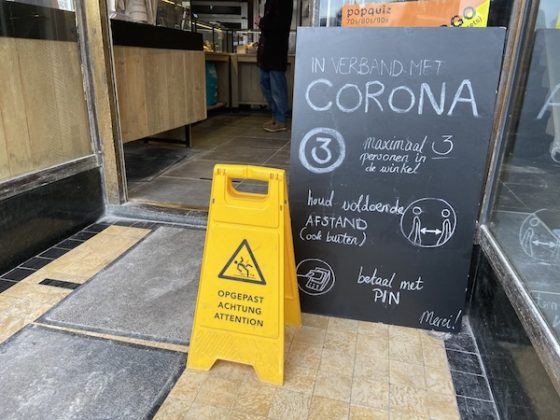
On Saturday, February 27, it will be a year since the first case of coronavirus was reported in the Netherlands. Here is a timeline of how the disease spread through the country and the government’s response.
December 31 2019: Wuhan Municipal Health Commission in China announces 27 infections with a new type of coronavirus, which will become known as Sars-Cov-2.
January 20 2020: The United States and South Korea both report their first novel coronavirus cases to the WHO.
January 24: Europe’s first case is reported in France.
February 21: Carnaval weekend begins, with revellers cramming into bars and nightclubs in southern Dutch provinces.
February 27: The first positive test for coronavirus in the Netherlands is announced live on television by deputy health minister Bruno Bruins. The 56-year-old man being treated in Tilburg, Noord-Brabant had been on a work trip to northern Italy and attended Carnaval celebrations.
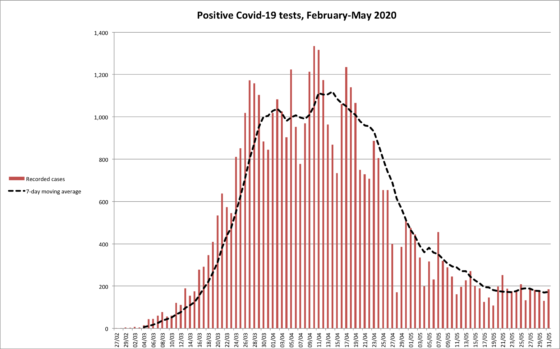
March 5: The number of confirmed cases more than doubles from 38 to 82.
March 6: The Netherlands’ first death from Covid-19 in the Netherlands is confirmed. The 86-year-old man was being treated in Rotterdam.
March 8: Italy quarantines 16 million people living in the north of the country.
March 9: Hand shaking is banned and people in Noord-Brabant are advised to work from home for the next seven days. The Italian quarantine is extended to the whole country.
March 12: The work from home rule is extended to the whole country. Prime minister Mark Rutte refuses to close schools, insisting children are ‘not a big risk group’.
The KNVB cancels all domestic football matches until March 31.
March 13: The number of confirmed Dutch Covid-19 deaths doubles from five to 10.
March 15: The ‘intelligent lockdown’ in the Netherlands begins with a legal requirement to keep 1.5 metres apart. Schools are closed until April 6. Cafes, restaurants, sports and sex clubs are given less than an hour’s notice to close.
Another 176 new cases take the total past 1,000.
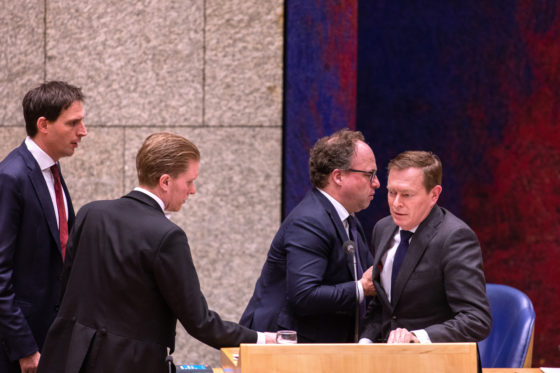
March 16: In a television address from his office, Rutte warns that ‘a large proportion of the Dutch population will be infected with the virus.’ He says the government is pursuing a strategy of ‘maximum control’ but also talks of building a ‘wall of immunity’ to protect the vulnerable.
March 17: An economic support package is drawn up to pay companies up to 90% of their wage bill.
EU member states agree to close their external borders for 30 days.
March 18: The Eurovision Song Contest, due to take place on May 16 in Rotterdam, is cancelled.
March 19: Bruno Bruins resigns as deputy health minister, a day after collapsing during a debate in parliament on corona.
Health minister Hugo de Jonge bans visits to nursing homes.
March 20: Another 30 deaths bring the total to 106. Just under 3,000 people have now tested positive for the virus, one-third of them in Noord-Brabant.
King Willem-Alexander gives a televised address urging people to care for the vulnerable: ‘We can’t stop the coronavirus, but we can stop the virus of loneliness.’
March 23: Stricter lockdown rules are announced by Rutte and justice minister Ferd Grapperhaus. Groups of more than three people in public are banned and the ban on mass gatherings is extended to June 1. ‘Contact professions’ such as hairdressers, nail studios, tattoo parlours and physiotherapists are ordered to close.
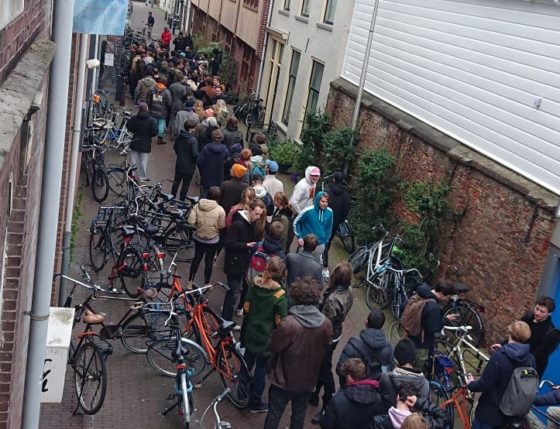
March 26: Diederik Gommers, head of the National Intensive Care Association (NVIC), says the Netherlands is in a ‘race against the clock’ to increase IC capacity to 1600 by April 1.
March 28: A preliminary study of more than 1,000 hospital staff in Brabant finds that the virus was present in the Netherlands two weeks before the first official positive test.
March 29: More than 1,000 new positive tests are reported for the fourth day in a row, taking the total past the 10,000 mark.
March 31: Lockdown measures are extended until April 28. Rutte warns that ‘we will not go straight back to normal’ when the restrictions are lifted.
April 1: The Netherlands proposes an EU ‘corona fund’ to relieve badly hit nations, but the government remains opposed to mutualised debt instruments such as eurobonds.
April 7: A record 234 deaths are announced, more than double the previous day’s total. In total 2,101 people are now known to have died.
April 8: The number of coronavirus patients in intensive care falls for the first time, by 16 to 1,408.
April 10: Statistics agency CBS says 5,100 people died in the first week of April, 2,000 more than the average for the first 10 weeks of 2020.
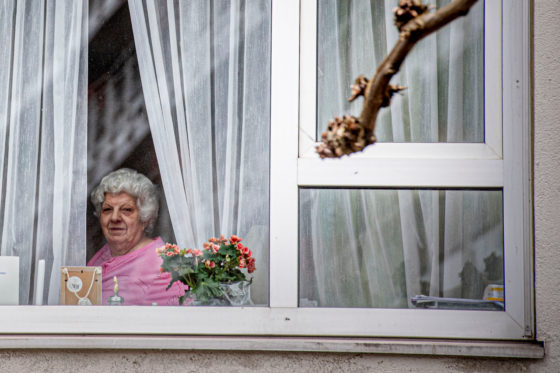
April 14: Jaap van Dissel, head of infectious disease control at the public health agency RIVM, dismisses the use of face masks to control infections. He says non-medical masks risk giving people a ‘false sense of security’.
April 15: Rutte says ministers are looking at ways to ease the lockdown once pressure on the healthcare system eases, on condition that the spread of the virus can be monitored and the elderly are protected.
April 16: MPs call for face masks to be required when restrictions are eased.
April 21: The government announces primary schools can reopen on May 11. Children under 12 will be allowed to play sport and train with clubs, but the ban on public events is extended to September 1.
April 24: The number of Covid-19 patients in intensive care falls below 1,000. Deaths in care homes have fallen to just under 1,500 in the last week, still considerably above the average.
The KNVB officially abandons the football season. Ajax and AZ Alkmaar will play in next season’s Champions League.
April 26: Coronavirus is detected in animals on two mink farms in Noord-Brabant.
May 1: Public transport operators call for face masks to be made compulsory on buses, trains and trams.
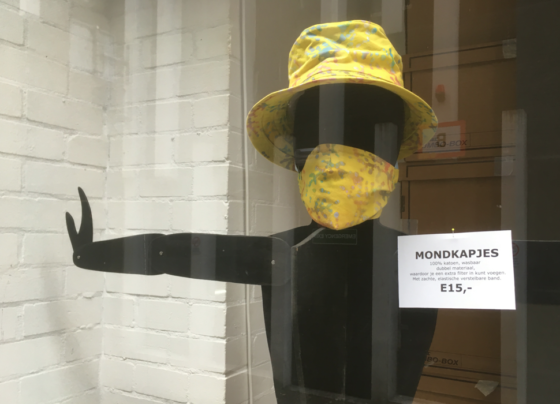
May 2: Elderly care association Verenso says the spread of infections in care homes is ‘stabilising’.
May 3: Another 69 deaths take the total past the 5,000 mark.
May 4: King Willem-Alexander delivers the Remembrance Day address in a deserted Dam Square.
May 5: A small number of protesters mark Liberation Day with ‘Stop the Lockdown’ demonstrations in The Hague and Utrecht.
May 6: The cabinet publishes its plan for a staged relaxation of the lockdown. On June 1 secondary schools, hairdressers, restaurants, cinemas and theatres will reopen. Restaurants, cafes and cinemas will be limited initially to 30 customers. Face masks will be compulsory on public transport for everyone over 13.
May 10: The number of intensive care patients returns to ‘normal’ levels, with 507 Covid-19 patients in IC beds.
May 11: Some hairdressers reopen at the stroke of midnight as they start to clear the backlog of appointments.
May 14: The economic planning agency CPB says there was an ‘historic fall’ of 13% in the number of hours worked during March.
May 15: Statistics agency CBS says the Dutch economy contracted by 1.7% in the first quarter of 2020. It also calculates that the actual death toll from coronavirus is 3,600 higher than the official figure of 5,643.
May 19: Saunas and gyms are added to the list of venues that can reopen on June 1. Anyone who fails to wear a mask on public transport will face a €95 fine.
May 30: Developers hope to start testing a new coronavirus alert app in June, with the aim of having it ready by the autumn.
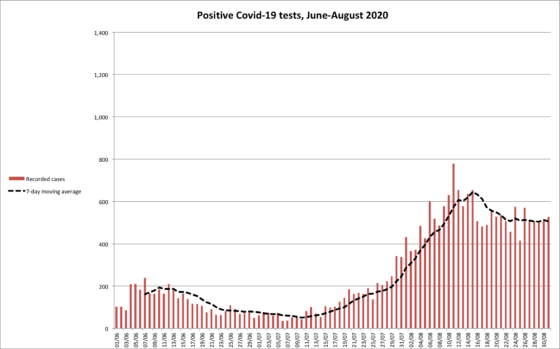
June 3: Travel to other European countries and those labelled ‘code yellow’ (observe local regulations) will be allowed from June 15. Sweden and the UK are excluded because of the high numbers of infections. People returning from abroad are strongly advised to quarantine for two weeks.
June 9: Lawyers, local authorities and privacy campaigners criticise the government’s proposed law formalising its coronavirus restrictions on the basis that it fails to safeguard people’s rights. The cabinet is hoping to secure Parliament’s approval before July 1.
June 24: The government says the vast majority of restrictions can be relaxed from July 1, but the 1.5 metre rule remains crucial. Hugo de Jonge says: ‘We can be done with the virus but the virus is not done with us.’
The Outbreak Management Team approves letting supporters back into football stadiums from September 1.
June 25: A trial of the coronavirus tracing app is announced in Twente.
June 26: Another 91 cases take the official total above 50,000.
July 1: The maximum number of people permitted in restaurants, theatres and cinemas is raised to 100. The same limit applies to weddings and funerals. Outdoor venues, including restaurant terraces, can accommodate up to 250 guests.
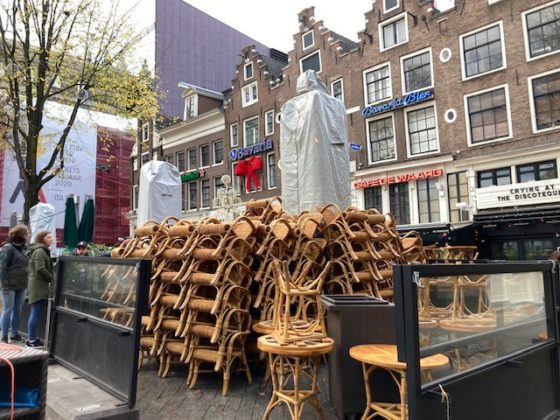
July 8: The government withdraws the coronavirus bill after critics said it infringed on people’s privacy. The CoronaMelder app is taken out of the law and will be dealt with separately.
July 9: The KNVB publishes a protocol for watching football matches when the season starts in September. Fans will have to keep 1.5 metres apart and will not be allowed to stand up, shout or sing.
July 10: The seven-day average number of cases drops to 51, from a peak of 1,120 in mid-April.
July 16: Travellers from the UK and Sweden will no longer be asked to self-isolate on arrival.
July 24: At least 38 cases are traced to a bar in Hillegom that put up a Facebook post encouraging customers to ignore the rules on social contact.
August 1: More than 400 cases are recorded in a day for the first time since May 7. The seven-day average figure has tripled in the past two weeks.
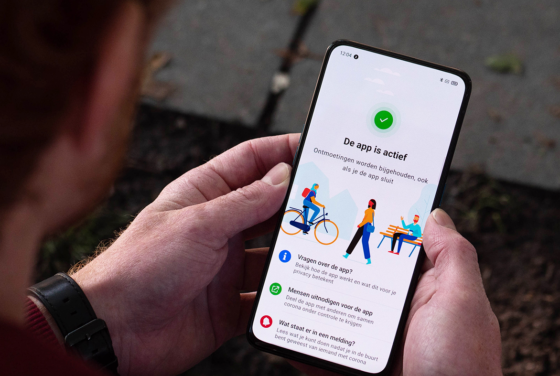
August 6: Student introduction week at the beginning of September is moved online.
August 15: Britain imposes a 14-day quarantine rule for travellers from the Netherlands and France. Morocco has also suspended flights to the Netherlands.
August 18: Home visits are restricted to six people, not including children under 13, as infections continue to rise. The quarantine term for returning travellers is reduced to 10 days.
The privacy watchdog AP expresses concerns about the proposed CoronaMelder app, particularly access to information by third parties such as Google and Apple.
August 28: Justice minister Ferd Grapperhaus apologises for breaching social distancing rules at his wedding after photographs of the ceremony are published. ‘A minister should always set a good example,’ he says.
August 31: De Jonge says the tracker app will not be launched on September 1 because the legislation underpinning it still has to go through parliament.
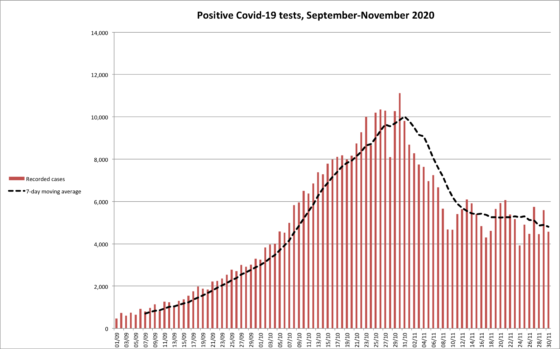
September 3: Grapperhaus survives a no-confidence vote in parliament over his behaviour at his wedding. Ministers will reconsider the €390 fine for not socially distancing, which automatically leads to a criminal record.
September 4: Spectators return to football matches for the first time since March as the Netherlands play Poland in Amsterdam. The Eredivisie season begins on September 12.
September 16: Rising cases in the major cities and student towns prompt calls for measures such as local curfews to be introduced. Belgium and Germany add Noord and Zuid-Holland provinces to their ‘do not travel’ list.
September 18: Extra restrictions are to come into force from September 20 in six health board regions. Bars will have to close at 1am and cannot admit new customers after midnight. Gatherings of more than 50 people will need a special licence.
Ferd Grapperhaus is fined €390 for breaching coronavirus rules.
September 21: Rutte tells football fans to ‘sit down and keep your mouth shut’ after many of the 13,000 fans at Feyenoord’s weekend match against FC Twente ignore the ban on standing up and chanting.
September 22: Jaap van Dissel says infections have reached a ‘tipping point’ after 13,471 cases were reported in the last week, an increase of 63%.
September 23: The total number of confirmed cases passes 100,000.
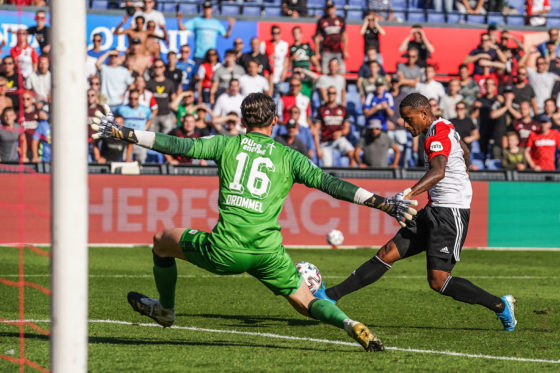
September 24: Latest figures indicate eight more regions will need to be placed in special measures to curb infections. Utrecht University epidemiologist Hans Heesterbeek says coronavirus is spreading out from the central urban belt ‘like an oil leak’.
September 27: Licensing hours are restricted in Groningen, Flevoland and four other areas.
September 28: New nationwide restrictions are announced. Closing time in bars and restaurants is brought forward to 10pm with last entries at 9pm. Spectators are banned from football matches again. Home visits are limited to three guests. Shoppers are advised to wear face masks.
October 2: Jaap van Dissel again tells NOS that non-medical face masks have ‘very little effect’, adding: ‘If people imagine they’re safer wearing a mask, that’s fine by us.’
October 6: Senators approve the CoronaMelder app, clearing the way for it to be launched on Saturday.
October 8: The fine for not complying with social distancing is cut from €390 to €95. Around 17,000 people who have been fined so far will not be refunded.
The European Union signs a contract for 200 million doses of the single-shot Janssen vaccine, produced in Leiden, of which 7.8 million will be allocated to the Netherlands.
October 10: The CoronaMelder app goes live. It will not be compulsory. People who receive notifications will be expected to go into self-isolation but can only take a test if they develop symptoms.
October 13: A ‘partial lockdown’ will begin from 10pm on October 14. Bars and restaurants will shut, initially for two weeks. Shops, apart from supermarkets, must close at 8pm. No alcohol is to be sold after 8pm. Sports matches are banned, except for professional football. Indoor gatherings are limited to 30 people. The cabinet begins drafting plans to make face masks compulsory.
October 14: Bars put up party tents in several locations, including the Plein in The Hague, just behind the parliament complex where MPs and ministers are debating the lockdown.
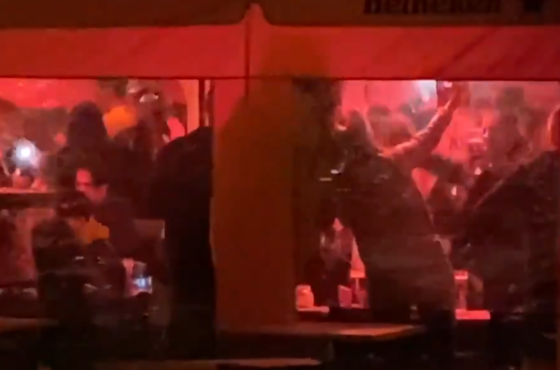
Sports minister Tamara van Ark says the women’s amateur football league can continue.
October 23: More than 10,000 infections are recorded in a single day for the first time. The group of independent experts known as the Red Team call for all non-essential shops and schools to close for two weeks.
October 27: The Senate passes the much-delayed coronavirus bill, anchoring social distancing restrictions and fines in law. Face masks and quarantine measures are not made compulsory but the cabinet says it is working on a mask mandate.
The partial lockdown is extended until mid-December.
November 3: Extra lockdown rules are brought in to speed up the decline in infections, which are back below 8,000 a day. Venues including cinemas, theatres, zoos and swimming pools are closed. Libraries can lend books at the door. Saunas and gyms remain open.
November 11: De Jonge says the second wave has peaked as the seven-day average falls below 6,000, but warns that restrictions will need to stay in place for several weeks.
November 26: The total number of cases in the Netherlands reaches 500,000.
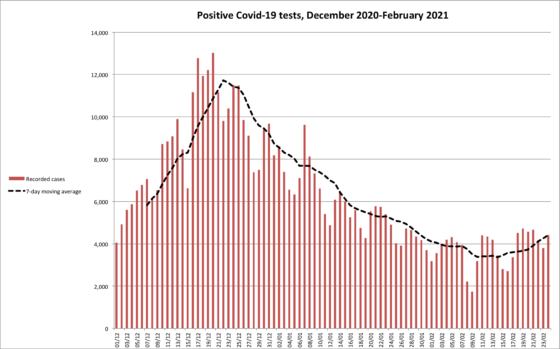
December 1: Face masks become obligatory in shops and other indoor spaces. Testing is extended to people who receive app alerts but have not developed symptoms.
December 2: Health minister Hugo de Jonge says he hopes to start the immunisation programme on December 4. Healthcare workers, the elderly and people with underlying health conditions will be vaccinated first.
December 8: The first injection with the Pfizer vaccine is given in the UK.
Rutte dampens hopes that the rules will be relaxed over Christmas after infections rise by 50% in a week. ‘Let’s make good use the Christmas period by staying home as much as possible,’ he says.
December 12: The number of people known to have died from coronavirus in the Netherlands exceeds 10,000.
December 14: A ‘hard lockdown’ is imposed until January 19 as infections go back to above 8,000 a day. All non-essential shops will be shut from Tuesday and schools will close on Wednesday. A maximum of two visitors are allowed per day, except over the Christmas weekend when three people can visit.
December 18: De Jonge says the first invitations for vaccines will be issued on January 4 and the first injections given on January 11.
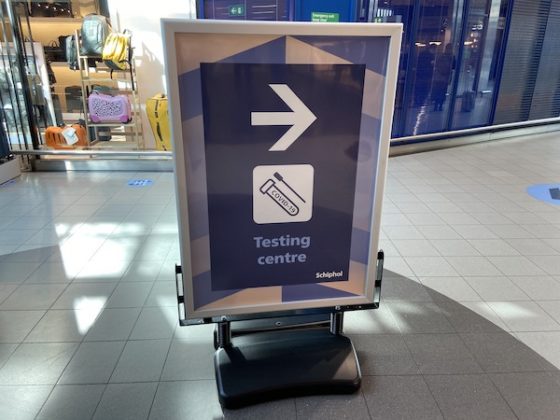
December 19: The UK says a new variant of coronavirus which is estimated to be 70% more infectious is responsible for a rapid increase in cases in recent weeks.
December 20: The Netherlands bans all incoming flights from the UK from 6am to prevent the new variant spreading. The ban will last until January 1.
Another 13,032 infections are reported by the RIVM, a record for a single day.
December 21: The European Medicines Agency approves the Pfizer vaccine.
December 22: Two infections with the new variant have been detected in Amsterdam, including one person who has not been in the UK recently.
December 27: Ten European countries, including Belgium, France and Germany, begin vaccinating. De Jonge says the jabs are ‘a bit symbolic’ and it is ‘not sensible’ to start earlier.
December 29: The total number of deaths in 2020 was 13,000 higher than expected, mainly due to coronavirus, the CBS reports.
January 4 2021: De Jonge brings forward the start date for vaccination to January 8 after hospitals say they will not wait. The health minister admits ahead of a debate in parliament that the strategy was ‘insufficiently flexible’.
January 6: The first person in the Netherlands to be vaccinated against coronavirus is Sanna Elkadiri, a nursing home worker from Eindhoven.
Another 173 deaths are recorded, the highest daily number since mid-April.
The EMA approves the Moderna vaccine.
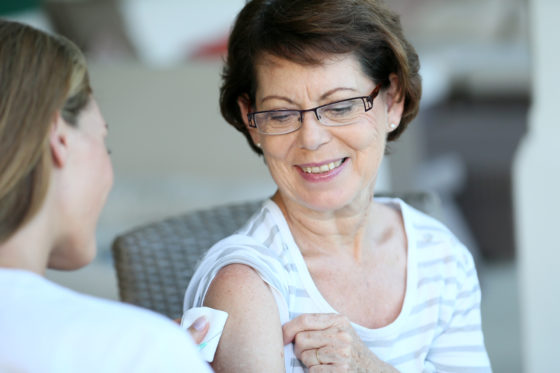
January 11: Vaccination of essential healthcare workers begins in Drenthe, Amsterdam and The Hague.
January 12: The lockdown is extended until February 9 despite cases falling since Christmas. Rutte urges people not to travel abroad until the end of March. The government is also considering imposing a curfew.
January 18: The first vaccine doses are given to nursing home residents.
January 20: Rutte announces the first national curfew since the war, to begin at 8.30pm on Saturday and run initially for three weeks. Exceptions will be made for work, emergencies, international travel and dog walkers.
Home visits are further limited to one person per household per day. Travellers to the Netherlands will have to produce two negative PCR tests on entry. Funerals are restricted to 50 mourners from January 25.
The gap between vaccine doses is extended from three weeks to six to allow more people to receive their first jab earlier.
January 21: After a day’s debate, parliament backs the curfew but delays the start time by 30 minutes to 9pm. Rutte promises that the measure will ‘go in the bin’ at the first opportunity.
January 22: AstraZeneca says it is only able to deliver 31 million doses of its vaccine to the EU rather than the 80 million originally planned. The Netherlands’ allocation will be cut from 2.9 million to 920,000. Hugo de Jonge warns it will delay the vaccine roll-out.
January 23: The first night of the curfew is marked by rioting in the former island village of Urk, where a coronavirus testing centre is burned down, and Stein, in Limburg.
January 24: Riots spread to around 10 towns and cities, including Amsterdam, The Hague and Eindhoven. Police use tear gas and water cannon to disperse the crowds. Around 240 people are arrested.
January 25: More than 184 arrests are made after a third night of unrest.
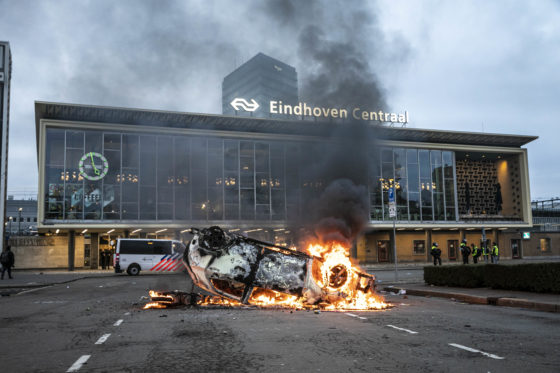
January 26: Vaccinations begin for people over 90 living at home.
Two people are arrested for selling personal data, including social security numbers and dates of birth, taken from coronavirus testing databases.
January 29: First vaccines for people aged over 85 and older living at home.
The EMA approves the AstraZeneca vaccine for use in the EU.
January 31: Education minister Arie Slob says primary schools and daycare will reopen on February 8, but secondary schools remain closed.
February 1: Hugo de Jonge changes the method for measuring vaccine doses. His claim that hospitals and long-term care institutions are ‘underreporting’ vaccination sparks an angry rebuke from the acute care sector.
February 2: Rutte and De Jonge confirm the reopening of schools at a press conference. Shops will be allowed to open as pick-up points for online orders. A decision on extending the curfew is delayed.
February 3: The seven-day average figure falls below 4,000 for the first time since October. More than 400,000 vaccine doses have now been given.
February 5: Vaccine invitations are sent out to 80-year-olds living at home.
February 6: The total number of infections passes the 1 million mark.
February 7: Storm Darcy forces the closure of all testing and vaccination centres as the Netherlands experiences its coldest temperatures in eight years.
February 8: The curfew is extended until March 3. Police have fined nearly 7,000 people in the past week for breaching the stay-at-home order.
February 11: Family doctors begin vaccinating people aged over 63 as well as those with Down’s syndrome or morbid obesity with the AstraZeneca vaccine.
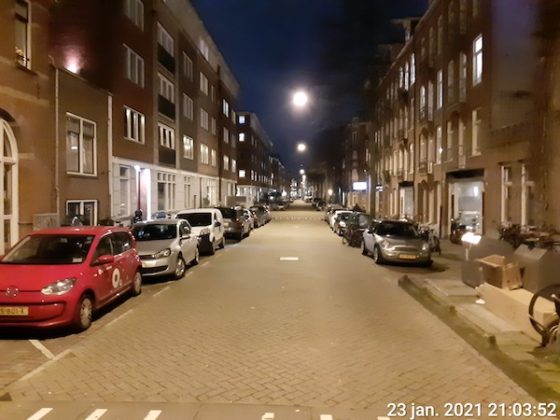
February 12: The cabinet allocates €200 million for a ‘social support package’ for people struggling with their mental and physical health during lockdown. A study finds that the ‘loneliness pandemic’ will cost an extra €2 billion in healthcare.
Amsterdam’s mayor Femke Halsema says young people should be prioritised as restrictions are lifted. ‘Too many vulnerable young people are missing the chance to connect with a successful adult life,’ she tells Nieuwsuur.
February 16: A judge in The Hague rules the curfew is invalid because the government should not have used emergency powers to introduce it. The case was brought by anti-lockdown activist group Viruswaarheid. The appeal court decides the curfew should remains in force while it considers an appeal by ministers.
The CBS says the economy contracted by 3.8% in 2020, its worst performance since the Second World War.
February 17: The government brings emergency legislation before parliament to comply with the court ruling on the curfew.
Another 88 deaths bring the official total past 15,000.
February 19: The court of appeal delays its decision on the curfew for another week. The Senate approves the replacement law.
Rutte says the situation is ‘not looking hopeful’ ahead of next week’s press conference as pressure mounts to reopen secondary schools, hairdressers and shops.
The CBS says the death rate has returned to its normal seasonal level for the first time since October.
February 21: More than a million vaccine doses have been administered and 154,400 people are fully immunised, the health ministry says. Capacity is expected to increase to 2.5 million a week in the second quarter of the year.
February 22: AstraZeneca says another 217,000 doses of its vaccine will be delivered later than planned. De Jonge says the news is ‘very disappointing.’
February 23: Mark Rutte says the government is prepared to take ‘a few more risks’ to ease the impact of lockdown. Secondary schools and vocational colleges can resume on a limited basis on March 1. Hairdressers and other contact professions can reopen from March 3, shops can open by appointment and people under 27 can take part in non-competitive sport.
The curfew is extended to March 15.
Thank you for donating to DutchNews.nl.
We could not provide the Dutch News service, and keep it free of charge, without the generous support of our readers. Your donations allow us to report on issues you tell us matter, and provide you with a summary of the most important Dutch news each day.
Make a donation